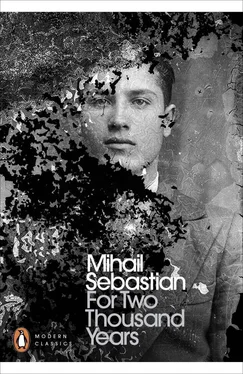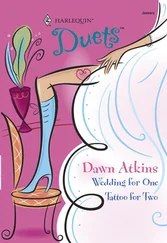*
The synagogue of my childhood had small windows with blue and red frames. That’s the source of the light in Marc Chagall’s paintings. I remember well those two bronze lions that sat guard on each side of the tablets of Moses. In Chagall’s drawings I come across them again. It’s a new kind of fauna, passed first through gold and bronze, through fabrics, ornamented by an entire folk-memory. Chagall has his roots in this old synagogue tradition. He’s a Talmudist who has had his fill of abstractions, a Hasid who has set off for the countryside, where he will turn his worried eyes on the lazy gait of oxen, where he will smell the damp earth, follow the skittish flight of sparrows, but will not forget, will not manage to forget, the eternally nodding reader in the synagogue, leaning over the open books.
*
I’ve returned to the rue de La Boétie with Maurice Buret. He’s a good judge of painting, but he doesn’t like Chagall. When he stood before the paintings, I could feel the hostility of a man who has only ever permitted himself carefully measured emotions. In the bus, on the way back, he explained to me:
‘I dislike tumult. Perhaps you find it exciting, but it doesn’t agree with me. Heavy symbols, unfinished verses, confused images, what good are they? I find it all a bit twisted, and it unsettles me, makes me uneasy.’
‘You want to feel at ease?’
‘I do. Is that shameful? Every individual does, if they have any self-respect. I certainly do want to feel at ease and don’t wish to be subjected to random bursts of lyricism, whether in life or books or painting. I won’t have myself swooning, so why stand for it in others? You can only get along with those who can keep a grip on themselves, who are in control of their ideas, who keep an eye on their feelings and keep their emotional turmoil to themselves. I’m a Frenchman. And a Breton, furthermore. I have no patience with Teutons and Jews.’
‘An anti-Semite?’
‘Yes. Not in politics, but in psychology, certainly. I hope you understand and are not offended.’
‘Dear Maurice, in my career as a Jew I’ve known so many furious anti-Semites. You, as anti-Semites go, are just a dabbler, an amateur. Far from being offended, it is an honour.’
‘Thank you, that’s very kind, but I have to warn you that it’s unmerited. Whether dangerous or not, I’m still an anti-Semite. Or, to put it better, I’m against certain expressions of Judaic sensibility and psychology. I detest the agitated, convulsive, fevered aspect of the Jewish spirit. There’s a Jewish way of looking at the world that distorts the proportions of nature, disturbs its symmetry, attacks its reality. The dreamlike tendency you were praising in Chagall is exactly what I denounce. My eyes are wide open. I don’t like those who are only half awake. Your Chagall stumbles about between sleep and wakefulness, which disqualifies him from making art. A clear-headed Jew is a phenomenon. The great majority are sleepwalkers.’
‘Perhaps, before I respond, we should agree on what the term “clarity” means. Do you believe there’s a single way of being clear? A notary can be clear, or a poet, but they don’t seem to me the same thing.’
‘Perhaps. But I’ll take the clarity of the notary. A notary thinks along the purest line of the French tradition: a word for each idea.’
‘And so? This is more a stylistic virtue, not one of life. Clarity can be sterile, while tumult can be fertile. Some things are created in upheaval, at high temperatures, which the frozen eye of clarity can’t take. There are things you understand with your blood or not at all.’
‘I object, most strenuously. You’re committing a major anatomical error. The organ man understands with is the head. Blood has other functions. This absurdity about “thinking with your blood” is Teutonic, Slavic or Jewish. A Frenchman would never say that. An Anglo-Saxon still less. I’m grieved to see you becoming emotional, which is synonymous with being Jewish. What a pity: I’m in danger of losing a friend.’
Here I am, defending the claims of spiritual tumult against lucidity. Ştefan Pârlea, if he could see me, would rejoice. To him, I’m a monstrous sceptic. Before Maurice Buret, however, I become a metaphysician.
I think in the Jewish spirit there is a continual open struggle between nature and intelligence, a struggle between extremes which none among us have reconciled. Because of this, to some we seem monstrously lucid, and to others we seem monstrously emotional. There will always be a Ştefan Pârlea to condemn our critical spirit. And a Maurice Buret to detest our tragic spirit. A golden mean should be found, but it’s hard to find, and once found it’s hard to hold on to. We commit ourselves carelessly, throwing ourselves down one road or another, and pay for this excess later through exhaustion and the antagonism of others.
Naive of Maurice to imagine he’s telling me anything new. Haven’t I made the same criticisms much more fervently? There’s a character in me who loves tension and the whirling tumult of raging winds. And there’s another that likes cold ideas, precise distinctions, reserve and waiting. Agreement is difficult between these two characters, but all my personal efforts are directed towards finding this agreement, which needs to be arrived at and maintained.
Michel Buret’s ‘anti-Semitism’ is, basically, nothing but an attitude of reserve — the only type of anti-Semitism possible in France. In the same way I might be anti-French or, more accurately, anti-Cartesian. It’s the marking out of an intellectual position, not an antagonism. There’s a buffer zone between the Jewish spirit and French values which time may well erode or the passage of generations overcome, but at the first meeting it is clearly very strong. Breaking through this wall of coldness is a problem for the individual, just as each of us has to overcome difficulties relating to personality or temperament.
In my case, I think I could manage the journey were it via Montaigne and Stendhal.
*
I said to Maurice Buret:
‘Do you never tire of your own intelligence? Has it never seemed wearying, demanding or inadequate? Having discussed everything, clarified everything and understood everything, isn’t there still a shadow or a light beyond your reach?
‘It is for remembering far too much that I would criticize you and the French spirit. You all have everything classified and assigned its place, as if in a laboratory, where every test-tube demonstrates a formula, a series of known reactions and certainties. It’s a barren landscape. Safe, but barren.
‘Your lives lack mystery and I wonder that you’re not bored of life. Life, in any case, Maurice, must be terribly bored in your company. You’re a person for whom there are no surprises. A “tactful person”, you would say. Perhaps. You’ll never let out a roar, never break anything, never jostle anyone. Politeness is your philosophy.
‘You guard yourself like a public institution. Policing yourself is your vocation. You have floors and apartments inside yourself for every feeling or thought, stairs and lifts which take you from one thought to another. You’re the doorman: you check who enters and leaves, close the doors, put out the lights, tidy up. You tend the houseplants, pruning any unruly branches, correcting drooping stalks, lopping off any shoots that rise too high. You can’t stand forests, you only feel good in parks. You yourself are your own park.
‘I’d like to know if, beyond the little certitudes that you cultivate, you ever stumble across the shadows of the dead … If you have ever shuddered at the feeling that what you do is petty, useless, vacuous, that all these “experiences” are barren, that you’re missing out on life … I’d like to know if you’ve ever had a sudden, irrational urge to throw everything to the wind and surrender to chance, letting fate take you where it will …
Читать дальше












